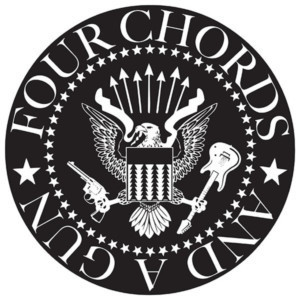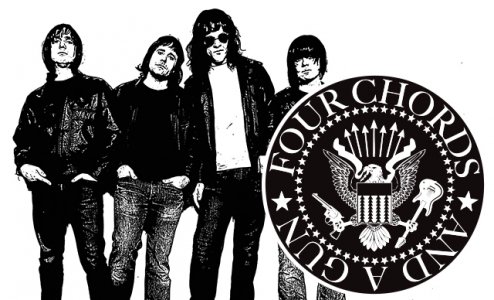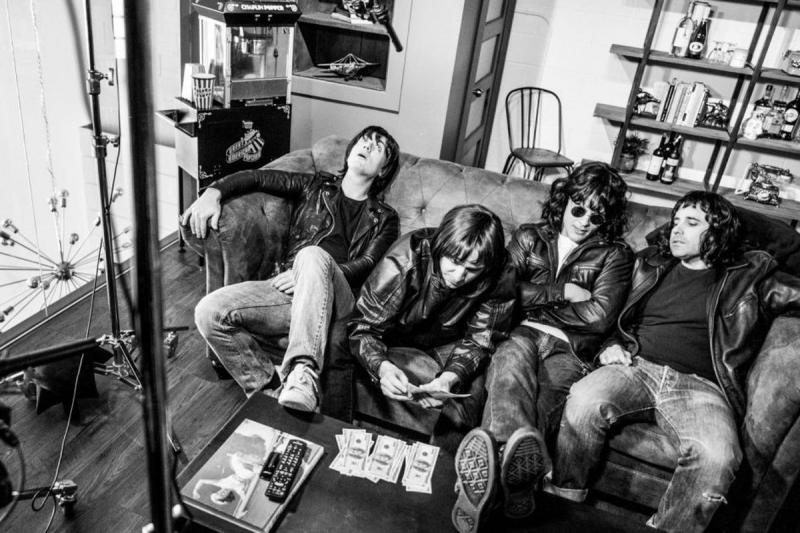Interview: John Ross Bowie Discusses Punk's Most Influential Band in His Play, FOUR CHORDS AND A GUN
 At Chicago's Broadway Playhouse, theatre fans and rockers alike are gathering to see Four Chords and a Gun, a play about punk sensations, The Ramones. Giving crowds a glimpse into the band's fascinating history, this play divulges into the riveting and tense conception of the Ramones album, End of the Century, produced by the eccentric gun wielding Phil Spector in 1979.
At Chicago's Broadway Playhouse, theatre fans and rockers alike are gathering to see Four Chords and a Gun, a play about punk sensations, The Ramones. Giving crowds a glimpse into the band's fascinating history, this play divulges into the riveting and tense conception of the Ramones album, End of the Century, produced by the eccentric gun wielding Phil Spector in 1979.
Fresh from its Toronto run at the Fleck Theatre in Canada, Chicago audiences will get the chance to see the story of one music's most iconic punk bands unfold. BroadwayWorld's Maeve Riley had the chance to chat with the writer of the show, John Ross Bowie ("The Big Bang Theory", "Speechless"), further delving into the inspiration behind the text, and discussing why this particular moment in time for the Ramones makes for a great theatrical narrative.
So many musician's stories have been turned into jukebox musicals over the past two decades. What persuaded you not to take the musical route for this show?
I worried that the second we got into musical territory - and this is coming from someone who loves musicals - we would get a little too corny for the material we were dealing with. The story of the Ramones specifically working with Phil Spector only covers two years of the bands life. It deals with betrayal, mental illness, addiction, and abuse. To drape the relatively sunny tones of "Cretin Hop" over that felt almost disrespectful. I also don't think that the ghost of Johnny Ramone would've approved a jukebox musical, whether the estate did or not. I looked at all the themes in the text about codependency, the struggles of collaboration, and how much work has to go into art. The band' work ethic was completely different from Phil's. You had the exacting Phil Spector, and the "let's record an album in a week" Ramones.

The Ramones have such an interesting and complicated history as a band. How did you know you wanted to focus on this period of the band's life?
I'm a very big fan of biographies that are not soup to nuts biographies. I like biographies that cover a couple of very pivotal years in a person's life. I like Ed Wood... I am less of a fan of the movie Ray. I enjoy Mike Leigh's Topsy Turvy, but I don't think I want to see a movie about everything Gilbert and Sullivan ever did. I like those more focused biopics. This show was always going to be a narrow focus on some chapter of the Ramone's life. This particular story is interesting because Dee Dee is struggling to stay clean and ends up in Los Angeles. It can be a boring place if you don't know anybody, especially for an unexpected and long period of time. It creates a horrible trap for an addict. You then throw in the character of Phil Spector, who's isolating Joey from the rest of the band. It's just one thing after another, you keep looking at it and think to yourself, "Why would you write about any other part of the Ramones' career?"
There's interesting events leading up to the first album's release, and there's incredibly sad stuff that happens around the end of the band's career, but there's so much energy, hope, and disappointment throughout the production of End of the Century. That's what made it seem like the best place to focus. I also just really love that record. There's an argument to be made that it's not a pure Ramones record because there were so many session guys on it, but I think it sounds really good. Joey sounds amazing on it. It's, in parts, the quietest Ramones record, but when it wants to be loud, it's Phil Spector making a really loud punk rock record. It's just great.
How did you go about researching the band for this project?
I did a lot of book research, and did very minimal interviews. I talked to a couple of the guys who worked with Phil, but it was mostly primary source autobiography research. We secured the music to be played interstitially between scenes because I want audiences to hear the music, however briefly. There's a lot of moving personnel in the Ramones estate.

What were the biographies and autobiographies that you used to inform the text?
I'm a sucker for any book about that era and about that band. I used to have a massive library, and then I loaned my books to the LA cast of this show and they never gave them back. I guess it's telling about how good those books are. Obviously Legs McNeill and Gillian McCain's Please Kill Me is like the Torah, it's an incredibly important text. Mickey Lee, Joey's brother, wrote a book called I Slept With Joey Ramone, which is incredibly well written. It's a real warts and all autobiography.
I was born in 1971 in New York City, but 1971 means I'm not exactly going to the Mud Club as an eight year old. So, I wanted to bring about more of the milieu. The book that helped set that tone for me was Love Goes to Buildings on Fire: Five Years in New York That Changed Music Forever by Will Hermes. It's covers five years of New York music (1973-1978). It starts with the New York Dolls playing the Mercer Arts Center, and then ends with the blackout in the summer of 1978. The next morning, after the power had been out all over the city, tons of new people had amps, DJ equipment, and instruments. The whole book is eye crack, you won't be able to put it down. That was a great book about the scene in general.
Monte Melnick, the band's road manager, has an amazing book that's called On The Road With The Ramones. It's a combination of a memoir and oral history. As you would expect, it's a pantheon of incredible stories. The problem with a book like that is that you read it, and you want to put absolutely everything into the soup and you can't. You have to strip a lot away.
As the writer of the show, what do you walk away with after the bows conclude and the curtain closes?
I think if you're a Ramones fan, you're reminded of the sacrifices they made to be the Ramones. If you're not a Ramones fan, or you're just the casual fan who's heard Blitzkrieg Bop in a car commercial, you are suddenly aware of the artistry that was behind these guys. As silly as they could be, they weren't cartoon characters. They had a really unified aesthetic that was very exciting, and hit people in a very pure place. It's interesting to see audiences open up and do the thing that I really wanted them to do from the get-go, which is to take the Ramones seriously. They never quite got the credit they deserve here in the states. They were playing soccer stadiums in South America! It's interesting that, for whatever reason, they never hit that massive top 40 appeal in their native country. And yet, everyone who bought that first album started a band.
FOUR CHORDS AND A GUN written by actor John Ross Bowie (The Big Bang Theory, Speechless) reveals the drama-filled 1979 recording session that led to The Ramones album, End of the Century, produced by Phil Spector.
Based on Bowie's exhaustive research, the script delves into the personal tensions between the punk band members as well as their often-violent struggles with Spector. It's a powerful story both funny and touching - which explores the Ramones, Linda Daniele (the woman who loved two of them) and the charismatic, destructive Spector.
Individual tickets are currently on sale and range in price from $39.95-$69.95 with a select number of premium tickets available. Tickets are available now for groups of 10 or more by calling Broadway In Chicago Group Sales at (312) 977-1710 or emailing GroupSales@BroadwayInChicago.com. For more information, visit www.BroadwayInChicago.com.
As a special "thank you" to the military, FOUR CHORDS AND A GUN announces current and veteran military members are eligible to receive up to four free tickets to FOUR CHORDS AND A GUN at Broadway In Chicago's Broadway Playhouse at Water Tower Place (175 E. Chestnut) from Thursday, May 23 to Sunday, May 27.
Tickets are limited and subject to availability. Interested participants must show their military ID at the Broadway Playhouse box office during open hours, starting Thursday, May 23 through Sunday, May 27. This offer is valid only in person.
Broadway In Chicago was created in July 2000 and over the past 19 years has grown to be one of the largest commercial touring homes in the country. A Nederlander Presentation, Broadway In Chicago lights up the Chicago Theater District entertaining more than 1.7 million people annually in five theatres. Broadway In Chicago presents a full range of entertainment, including musicals and plays, on the stages of five of the finest theatres in Chicago's Loop including CIBC Theatre, James M. NederlanderTheatre, Cadillac Palace Theatre, and just off the Magnificent Mile, the Broadway Playhouse at Water Tower Place and presenting Broadway shows at the Auditorium Theatre. Broadway In Chicago proudly celebrates 2019 as the Year of Chicago Theatre. For more information, visit www.BroadwayInChicago.com.
Videos
